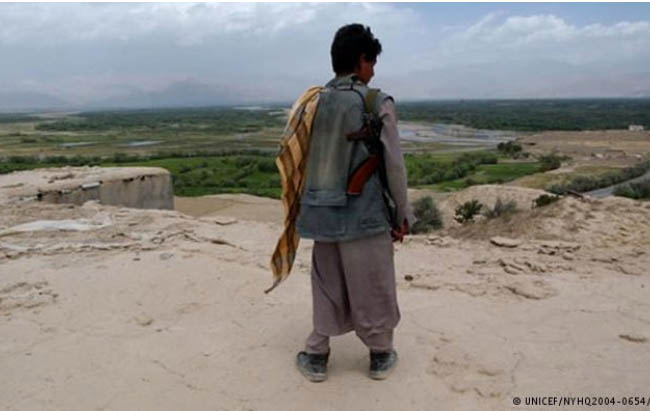Recruiting children as war soldiers by the militant groups has been on the rise, a Human Rights Watch report suggests. According to the HRW report, the Taliban recruit children to the militants’ ranks mostly from religious schools where they are supposed to get religious studies. Based on the report, most of the Afghan children fighting for the Taliban age between 13 and 17; however, their training starts even from the age of 6. Echoing the HRW report, Afghanistan’s Independent Human Rights Commissions says that the Taliban used children soldiers in their offensives in the northern provinces of Kunduz and Badakhshan last year. While using children as war soldiers is prohibited under international laws, the report reflects how the Afghan conflict continues to take tolls from children as one of the most vulnerable segments of the society.
The report comes at a time while the Afghan government has long been trying to have Afghanistan removed from the UN list of countries where children are used as war soldiers. Despite that the Afghan government has been committed to tackle the problem of recruitment of children as war soldiers by pro-government and militant groups, both the militant groups and pro-government militias have been reportedly using children as soldiers. Most recently, a 10-year Afghan boy, serving as a local police, was killed by the Taliban about two weeks ago in southern Uruzgan province.
Most of the children recruited by the Taliban come from religious madrassas in northwestern Pakistan or in rural areas in Afghanistan where Taliban have considerable influence. Those madrassas are playing a dominant role in driving Afghan children into being used in the conflicts. The madrassas have long played the role of supplying manpower for the Taliban’s war machine both during their regime before 2001 and after their overthrow by the US-led invasion. Hundreds of such madrassas operate out of control of the Afgahn government, mostly beyond the border in neighboring Pakistan’s tribal areas. The children are received at the madrassas by promises of receiving religious education with free boarding and no tuitions. The Taliban remains huge influence over the madrassas as most of them are operated by well-known pro-Taliban religious figures, some of whom played vital roles in founding and mentoring the foundation of the Taliban movement in 1990s. Almost all of those madrassas are known for their approach in radicalizing their young students.
Poverty and religious imperatives are main motives behind those families sending their children to the religious madrassas. The religious madrassas operating provide free boarding and living expenses for their students, who are mainly from both sides of the shared border.
This plays as a huge incentive for the families who want their children receive religious education with no financial burden on their shoulders. Many of the poor but religious families even don’t think of any other option as the madrassas seem desirable for them.
Due to the pull factors of the madrassas with extremism leniencies, the Afghan government has been planning to promote religious education at home and substitute with what the madrassas offer. However, the government’s efforts to provide the alternative religious education inside the country have failed to prove effective as they have been facing financial, social and structural challenges. The government desires to promote the more official school education through the ministry of education while, in the meantime, support and oversee mosques and centers of religious studies as well. However, the initiative of supporting provision of religious schooling has been largely ineffective as it has been unable to compete with what the religious madrassas in northwestern Pakistan offer. On other hand, even the official schooling has been facing challenges due to insecurity and violence across the country particularly in the southern and western provinces. The Taliban have continued to burn schools and threaten education department and schools’ staffs.
In the long run, promoting social awareness and boosting level of literacy across the most conservative areas in the country would be a key factor for reversing the trend of Afghan children attending religious madrassas in Pakistan and then being recruited by the militant groups. The government needs to start and plan for tackling the root causes of children being attracted to extremist religious madrassas and then becoming foot soldiers of the extremist groups. Boosting welfare of the citizens as well as promoting public knowledge through the media would play a key role in persuading them to consider formal school education for their children. Only a sustainable improvement in boosting financial status and level of literacy and education of the people would help overcoming poverty and the conservative culture as the main driving forces of children and youths being recruited by the militant groups.
The issue of child soldiers in Afghanistan highlights the plight of Afghan children as there is no sight for the end of the conflict in the country. The government needs to redouble efforts and take immediate actions to prevent recruitment of children as war soldiers both by pro-government militias and the insurgent groups. The government needs to do more to stop the current worrying trend of children being used as soldiers.
What the government can do now is to start making laws aimed at preventing use of children as child soldiers and lead systematic campaigns for providing awareness to the public. There are the civil organizations and the mass media to play a role in promoting children’s rights and public awareness over the issue. The government must take immediate actions to prevent private and pro-government militias such as the Afghan Local Police use children as soldiers in the war against the militant groups. It also can seek the UN and other international agencies’ assistance to persuade the Taliban and other militant groups to respect international laws and basic human values and not use children in their war efforts against the government.
Home » Opinion » Taliban’s Child Recruits
Taliban’s Child Recruits
| Abdul Ahad Bahrami

